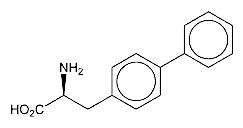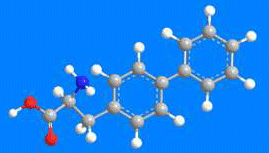

4-Biphenylyl-L-alanine (BipA) is a synthetic amino acid that was prepared to put a “leash” on genetically modified Escherichia coli. It replaces phenylalanine in the codon of unmodified E. coli. Additional phenylalanine derivatives have been made for the same purpose.
G. M. Church at Harvard Medical School and F. J. Isaacs at Yale University are using E. coli as a model to explore ways to prevent genetically modified organisms (GMOs) from reproducing in the environment. Tagging a GMO with a non-natural amino acid such as BipA allows it to reproduce in the laboratory but not in nature. If this strategy is successful, the next step would be to extend it to commercial GMOs such as crop plants.

Learn more about this molecule from CAS, the most authoritative and comprehensive source for chemical information.
Molecule of the Week needs your suggestions!
If your favorite molecule is not in our archive, please send us a message. The molecule can be notable for its current or historical importance or for any quirky reason. Thank you!
Stay Ahead of the Chemistry Curve
Learn how ACS can help you stay ahead in the world of chemistry.

